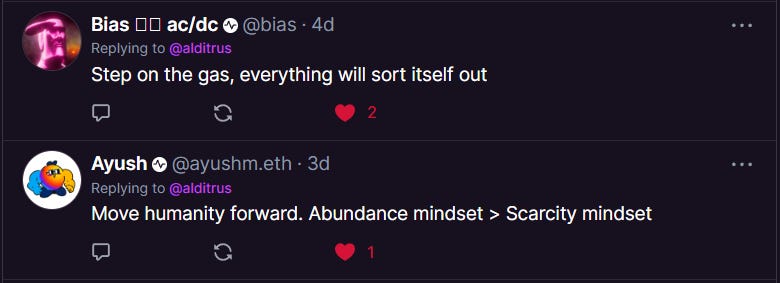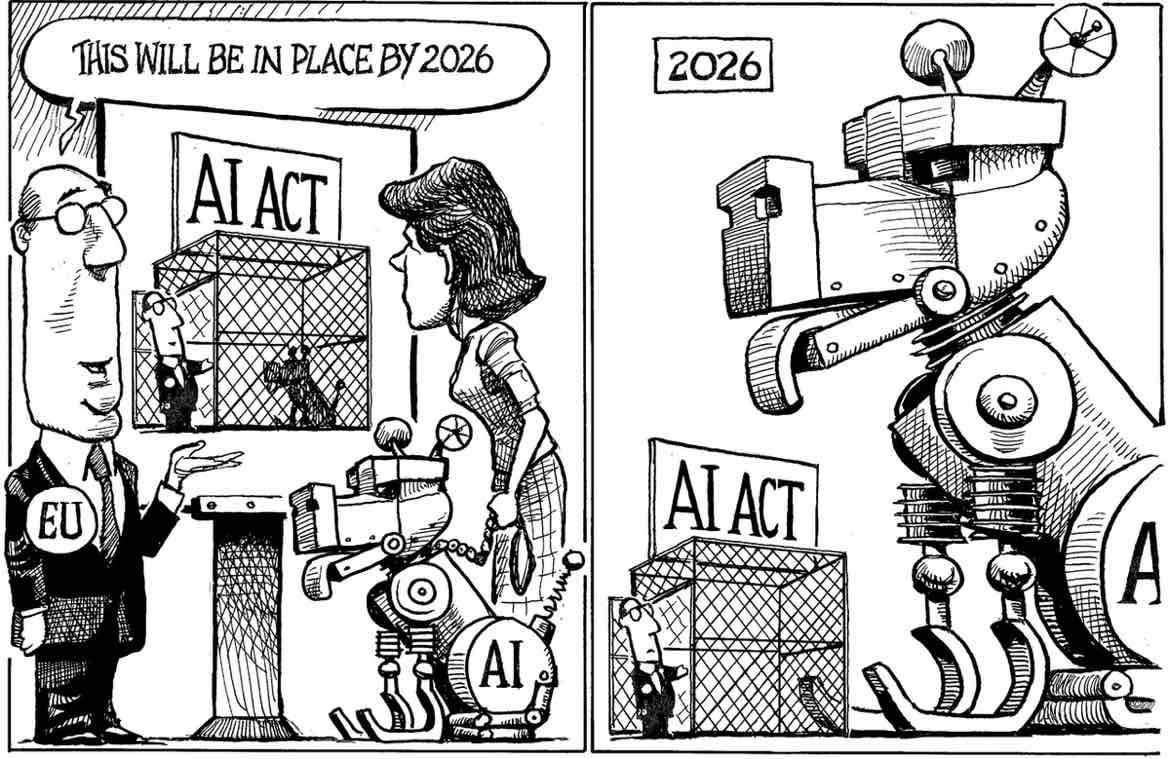Go Fast and Fix Things: My thoughts on effective accelerationism

I’ve been active on Farcaster for about half a year now. The great thing about the FC community is that it’s exposed me to certain philosophies and viewpoints that I would not have considered otherwise. One specific philosophy that has become rather popular on the protocol is what’s called “effective accelerationism” or “e/acc”. When I first heard this term, I was a little confused as to what it meant. I was familiar with effective altruism, the popular yet controversial philosophy championed by the now disgraced Sam Bankman Fried. I was also rather familiar with Nick Land’s accelerationism thanks to Slate Star Codex’s Meditations on Moloch.
I later gathered that the philosophy is more or less what it says on the tin: accelerating technological development to ultimately better humanity and lead us to a brighter future. It’s a philosophy which posits that technology can only benefit our species and we need to develop it as fast as we possibly can in order to create what is, essentially, Utopia. e/acc appears to be the most popular among AI proponents and enthusiasts but it has, naturally, bled into other technological sectors such as blockchain and by extension, defi and web3.
When I first started learning about e/acc, I was at first skeptical. Accelerationism is more or less the axiom of “move fast and break things”, a motto devised by Zuckerberg, aka the guy who poisoned our society with the world’s most toxic and divisive social media platform. The whole reason I wanted to join web3 and be a proponent of decentralization was to stick it to oligarchs like Zuckerberg and make sure no one would have such centralized control over the web again. Why would web3 builders want to embrace a philosophy that is responsible for making the internet the corporatized, enshittified, ad-ridden mess it is now? The whole thing left a bad taste in my mouth.
Be it known that I’m by no means anti-technology or a “decel” if you will. I know there are many people who cling onto the notion that modern technology is evil and that it either must be tightly regulated or banned altogether. While I can understand their frustration and disillusionment, this view is not only naïve but also fruitless. Technology only progresses in one direction, not backward, and it has become decentralized enough that someone will continue to develop it, regardless of any attempts at regulation.
I firmly believe that technology, of all types, can and ultimately will benefit humanity and will enable our species to reach it’s divine and cosmic destiny. However, I am also cognizant of the fact that the same technology can also be used for malicious purposes. In this discussion on techno-ethics, I like to take a balanced approach; at the end of the day, technology is simply a tool. You can go to the hardware store and buy a hammer. You can either use said hammer to build a house, repair a leak in the roof, build a coffee table, etc. or you could use the hammer to bash someone’s head in, or break into their house and steal their stuff. Just because you used the hammer for evil doesn’t necessarily means it’s evil. It’s just a hammer. It all comes down to intent. A sword is only as virtuous as the warrior who wields it.
I believe for technology to benefit us, it must be developed and distributed democratically and with wisdom. “With great power comes great responsibility”. Our modern technology has given us unimaginable power, but so far we have failed to wield it responsibly. So the question is, how do we ensure the ethical and responsible development and deployment of technology while also encouraging innovation? I don’t believe the answer to be government regulation. Our governments are growing increasingly geriatric and our politicians do not adequately understand modern technology enough to draft effective legislation. Not to mention that our governments move far too slow to catch up with technology that is evolving at an exponential rate. Also not to mention that many of our governments have become so bitterly divided and gridlocked that they’re unable to do anything useful anyway.
So no, government regulation is not the answer. But without the intervention of government institutions, how on earth do we enforce the ethical use of technology? While there is no perfect solution, I believe that the best solution lies at the heart of what blockchain and web3 is all about: decentralization.
During my exploration of e/acc, I came across Vitalik Buterin’s post regarding the subject. I won’t go into too much detail about the article, and I encourage you to read his post yourself, but he essentially proposed another variant of e/acc called d/acc. The “d” in this case can stand for a number of things: defense, decentralization, or democracy, but the main idea is accelerating technology while also taking precautions to make sure the technology is well aligned. One way this can be done, and the definition of d/acc that I resonate with the most, is using decentralized systems and coordination mechanisms to reach consensus of how the technology should be developed. Decentralizing control of the technology also ensures that it’s not developed by only a small handful of powerful entities, further ensuring that acceleration is decided upon in a democratic fashion.
Obviously he goes into far more nuance than I did and my summary is super simplified, but I personally like this interpretation of effective acceleration. It encourages increased innovation while also providing possible solutions to safe and responsible development. I want to help our world break out of the rut of stagnation it’s currently stuck in, and I also want us to break free of the crumbling and sclerotic institutions that are holding us back. I want to push the gas down just as badly as anyone. However, I also want to make sure we aren’t speeding directly into a dystopia worse than the one we have now. If we’re going to accelerate, we should have at least some control of the wheel.
My favorite part of Vitalik’s post is his optimism for the future and his positive view of humanity, that as flawed as we are, we are inherently good. That is an attitude I greatly admire. Nick Land, the originator of accelerationism, sees humanity in a far more cynical light, even an adversarial one. Yes, we are part animal and we often act like one, but there’s also a part of us that make us better than most animals on earth. I can’t put a finger on exactly what that part is, call it morality, or soul, or the indomitable human spirit. It’s the part of us that constantly wants to improve, to be better, not just for ourselves but for those we love. It’s that part of us that dreams of one day leaving earth and living among the stars. It’s the part that seeks for the spiritual and divine, to find a higher purpose than simply existing. It’s the part that takes pity on our fellow men and acts selflessly for their benefit. It’s that part of ourselves that makes us plucky, adaptable, resourceful, and resilient. I can’t think of another animal on earth who has that type of spirit.
At the end of this learning journey, I find myself aligned with decentralized acceleration. With this explosion of technology we are experiencing, humanity is now transitioning through a crucial inflection point. It’s time for us to take full advantage of this opportunity.
Yes we should accelerate, but first make sure to defend and decentralize as best we can. Then, grip the steering wheel and push that gas pedal down. All the frigging way.
A C C E L E R A T E




